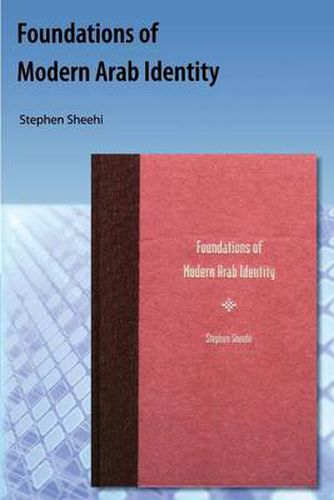Readings Newsletter
Become a Readings Member to make your shopping experience even easier.
Sign in or sign up for free!
You’re not far away from qualifying for FREE standard shipping within Australia
You’ve qualified for FREE standard shipping within Australia
The cart is loading…






This title is printed to order. This book may have been self-published. If so, we cannot guarantee the quality of the content. In the main most books will have gone through the editing process however some may not. We therefore suggest that you be aware of this before ordering this book. If in doubt check either the author or publisher’s details as we are unable to accept any returns unless they are faulty. Please contact us if you have any questions.
Examines a crucial period in Arabic literature which has received insufficient attention previously–the pre-modern writers of the 19th century … whose journalism and fiction not only shaped contemporary opinion but also subtly molded the contours and boundaries of discourse for the generations that followed. –Michael Beard, University of North Dakota
Dynamic and original, this study of the formation of modern Arab identity discusses the work of pioneers of the Arab Renaissance, both renowned and forgotten–a pantheon of intellectuals, reformers, and journalists whose writing until now has been mostly untranslated.
Against the backdrop of European imperialism in the Arab world, these literati planted the roots of modernity though their experiments in language, rhetoric, and literature. In both fiction and nonfiction they generated a radically new sense of Arab identity. At the same time, Sheehi argues, they created the terrain that produced an Arab preoccupation with failure and a perception of Western superiority –the terms intellectuals themselves used in the 19th century in diagnosing their cultural crisis.
Neglected by historians, this ambivalent and contradictory state of consciousness is at the heart of the ideology of Arab identity, Sheehi says, and it describes a variety of subjective positions that Arabs would adopt throughout the 20th century. It became the intellectual quicksand for the Arab world’s confrontation with colonialism, capitalist expansion, and individual state formation.
Using psychoanalytic and post-structuralist theory, Sheehi looks at texts by writers such as Butrus al-Bustani, Ahmad Faris al-Shidyaq, Muhammad al-Muwaylihi, and Muhammad Abduh. His analysis deconstructs popular and academic perceptions–especially prevalent after 9/11–that Arabs have failed to internalize modernity. Indeed, he says, Christian secularists, Islamic modernists, and romantic nationalists alike have produced a body of knowledge and shared an epistemology that constitute modernity in the Arab world.
Starting in Middle Eastern literature and intellectual history and ending in postcolonial studies, this groundbreaking work offers a sophisticated counter-theoretical framework for understanding and reevaluating modern Arabic literature and also the history and historiography of Arab nationalism.
$9.00 standard shipping within Australia
FREE standard shipping within Australia for orders over $100.00
Express & International shipping calculated at checkout
This title is printed to order. This book may have been self-published. If so, we cannot guarantee the quality of the content. In the main most books will have gone through the editing process however some may not. We therefore suggest that you be aware of this before ordering this book. If in doubt check either the author or publisher’s details as we are unable to accept any returns unless they are faulty. Please contact us if you have any questions.
Examines a crucial period in Arabic literature which has received insufficient attention previously–the pre-modern writers of the 19th century … whose journalism and fiction not only shaped contemporary opinion but also subtly molded the contours and boundaries of discourse for the generations that followed. –Michael Beard, University of North Dakota
Dynamic and original, this study of the formation of modern Arab identity discusses the work of pioneers of the Arab Renaissance, both renowned and forgotten–a pantheon of intellectuals, reformers, and journalists whose writing until now has been mostly untranslated.
Against the backdrop of European imperialism in the Arab world, these literati planted the roots of modernity though their experiments in language, rhetoric, and literature. In both fiction and nonfiction they generated a radically new sense of Arab identity. At the same time, Sheehi argues, they created the terrain that produced an Arab preoccupation with failure and a perception of Western superiority –the terms intellectuals themselves used in the 19th century in diagnosing their cultural crisis.
Neglected by historians, this ambivalent and contradictory state of consciousness is at the heart of the ideology of Arab identity, Sheehi says, and it describes a variety of subjective positions that Arabs would adopt throughout the 20th century. It became the intellectual quicksand for the Arab world’s confrontation with colonialism, capitalist expansion, and individual state formation.
Using psychoanalytic and post-structuralist theory, Sheehi looks at texts by writers such as Butrus al-Bustani, Ahmad Faris al-Shidyaq, Muhammad al-Muwaylihi, and Muhammad Abduh. His analysis deconstructs popular and academic perceptions–especially prevalent after 9/11–that Arabs have failed to internalize modernity. Indeed, he says, Christian secularists, Islamic modernists, and romantic nationalists alike have produced a body of knowledge and shared an epistemology that constitute modernity in the Arab world.
Starting in Middle Eastern literature and intellectual history and ending in postcolonial studies, this groundbreaking work offers a sophisticated counter-theoretical framework for understanding and reevaluating modern Arabic literature and also the history and historiography of Arab nationalism.